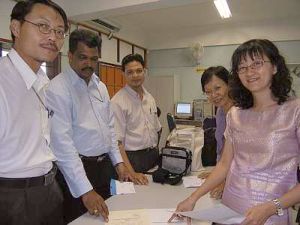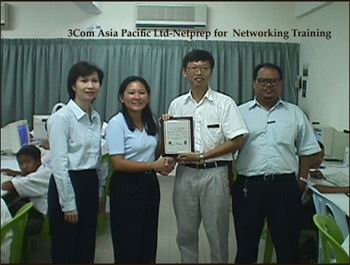Archive for the ‘ICT Culture’ Category
SMJK Dindings – Media Archives
The Star – Not for schoolwork only

Not for schoolwork only By HARIATI AZIZAN LUIIS is CENTRE of ATTENTION – Male, 18-years-old, from down south, Texas, United States pops up on the big screen in the front of the computer lab of SMK Sri Permata in Petaling Jaya, Selangor.
“That is mine,†exclaims Amir (not his real name) pointing to the big screen.

Chua (right) with her hardworking ICT team (from left) Koh Chin Kiang Ramani Kuppusamy, Abdullah Sani Deraman and Chin Siew Yin.
His monitor screen has been flashed on the large screen for all to see but instead of quickly clicking off, he simply continues to browse the other profiles on MySpace.
Like most teens around the world, Amir is caught up in the MySpace craze. He spends at least 20 minutes a day visiting the social networking website to see if he has made any new friends. Unlike most teens though, Amir does all this in school.
The latest football results pop up on the big screen next which soon morphed into a “world†from the webgame Utopia.
It is recess time at Sri Permata and the computer lab at the school is full of Form One and Form Two students checking emails, chatting online, playing games or just surfing the internet.
While most schools keep their computer facilities secure under locks, at Sri Permata, the school computer lab is an open avenue for students to hone their information and communication technology (ICT) skills.
Making IT accessible
According to the Education Ministry’s Educational Technology Division (BTP) the effectiveness of the ministry’s programmes in making teachers and students ICT savvy depends not only on how well the school is equipped but also the extent of usage of the infrastructure provided.
As reported recently, apart from schools without electricity supply in rural areas, all others have been installed with ICT infrastructure. The usage, however, is still below the ministry’s target.
According to World Bank standards, any facility should have 70% utilisation to be effective, says BTP director Datuk Yusoff Harun.
He says his division has received reports that many schools restrict computer usage due to various problems such as teacher shortage, lack of technical support and funding for maintenance.
They have received reports of schools keeping their labs locked all the time, he adds, and BTP’s job is to investigate and ensure that they provide more access to students and teachers, in line with the ministry’s Making Schools Smart programme.
This programme is aimed at creating an ICT culture in school where all students and teachers use ICT in their learning and teaching respectively.
“We have been tasked to monitor and collect data of computer usage in schools. Based on the data, we categorise the schools into grades – A to E – depending on the percentage of usage.
“For example, to be in Grade A, all teachers in the school need to use the computer in all their lessons while schools that have ICT facilities but are not using it at all (have a 0% usage) will be graded E,†he adds.
At Sri Permata, the computer lab is a popular hangout. Opened during school hours, recess time is its peak period, and the computer lab is often so full that students have to be turned away.
In fact, the computer lab is so popular among students that even students from the morning session are staying back after school to use the computers to finish their homework or surf the Internet.
Students are charged a fee of RM1.50 an hour to surf the Internet.
To help maintain the computer lab, the school charges students a minimum annual fee of RM70.
“The fees are used to pay for software licences, files, printing materials, diskettes, the Internet connection as well as lab maintenance,†says Chua Siwe Geck, the teacher in charge of the school’s ICT programme Komputer Dalam Pendidikan (KDP).
“Our students know we are monitoring what they are doing online and that we check on them all the time, so they do not misuse the computer,†she says.
Using an LCD system, the screens from students’ PC are randomly flashed in front of the class for 10 seconds.
This, stresses Chua, keeps the students in check.
“We don’t want to enforce a schoolwork only rule on the students when they use the computer because they need to take a break from class work sometimes and by using the computer they get to apply their IT skills,†adds Chua.
Interestingly, Internet games are allowed for students.
“I think we should not control the child because sometimes we adults also love to play games.
“The school enforces certain rules such as no visiting of pornographic or violent websites,†says Chua.
Students are asked to sign an agreement letter to abide by the rules.
“It’s like a Surat Akujanji and so far we have not had any problems,†she explains.
The right support
While most schools had to rely on donations from corporations in the IT industry or handouts from the Government, Sri Permata has its proactive Parent-Teacher Association (PTA) to thank for its computer programme.
The PTA sponsored RM80,000 to set up the computer lab in 2000.
As soon as the computer lab was ready, the school started its computer literacy classes for its Forms One and Two students.
Access to Internet has further honed their research, and information management skills.
Six years on, the computer programme is running independently. The hardware is upgraded every two years and for security, the computer lab is wired with an alarm.
However, says Chua, theft or robbery is the last thing she needs to worry about.
She attributes the smooth running of the computer programme to the teachers in her team working in the school computer lab.
“There are four teachers and one non-teaching staff. The teachers sacrifice their free time and recess time to make sure the students have the best at the computer lab,†she says.
There are now 40 PCs but the school hopes to set up a proper cybercafé in the school soon so that students can get more access to the Internet. Now, the computer lab is also used for the school’s IT classes and for other subjects.
“We have the room, but we need to raise more money to get the room ready,†she says.
A safe platform
Still, with all the access to Internet in school, Chua admits that students still go out to cybercafes to go online, as not all the students have Internet access at home.
“I’d say only about 50% of the students have Internet access at home.†She adds that she avoids giving them too much work using the computer or Internet because she is afraid they will use that as an excuse to go to the cybercafe.
“They will tell their parents that the teacher has given them work and they have to go to the cybercafe to finish it.
“We tried to open on weekends but there were many constraints.
“We are also afraid that if we open, students may tell parents that they are coming to school but then they go somewhere else,†she opines.
She believes most parents are not aware of what their children are up to on the net simply because they are not as savvy.
“Sometimes I joke about holding a workshop for parents. You should see how many start panicking – ‘No! don’t teacher – they’ll shout’,†she says with a laugh. Chua fully supports the government’s plans to curb cybercafes. She says she is aware that sometimes even those who have Internet connection at home prefer to go to cybercafes to get more freedom online, away from their parents’ eagle eyes.
That is why they hope to get their cybercafé hooked up soon, she says. “At least in school, they are monitored.â€
Original Story Link –
http://thestar.com.my/education/story.asp?file=/2006/11/5/education/15863552
CNet Asia – A fully-networked school rises in rural Malaysia

Original Article Published in CNET Asia, Nov 04, 1999
by Julian Matthews, Malaysian correspondent
LUMUT, Perak–If a school can be described as four walls with the future in it, then the Dindings National-Type Secondary School in rural Perak has confirmed its place in the new millennium.
Situated 95km from the nearest city Ipoh, the school is mostly made up of wooden buildings and wedged between a palm oil estate and a coconut plantation.
But running under the floors and in conduit piping along the corridors are Cat-5 networking cables inter-linking 70 PCs in the classrooms, the library, the staff room, the administration office, the science labs and computer labs. Every room has RJ-45 connectors that gives it instant access to the Internet on a 64Kbps leased line.
The school was wired almost entirely by its students who manage and administer the Redhat Linux 6.0 powered-server which houses their mail server, Apache web server, proxy server, newsgroups and Internet Relay Chat. “All my 690 students have their own email, can design homepages and do Linux, Unix and C programming,” said principal Tiong Ting Ming, 47. Students in the school range from 13 to 17 years of age.
Ironically, the school is not part of the 90 schools chosen as part of Malaysia’s Smart School Program which has been sharply criticized by the opposition for delays and faulty courseware.
Tiong spent seven years cajoling local corporations and benefactors to provide funding to transform the school into a network-ready environment for his students. Total investment currently amounts to RM1.8 million and major sponsors include Sapura Holdings, Mimos, Thomas & Betts and the Ministry of Education.
Tiong’s dedication earned the school its latest sponsor–networking giant 3Com Corp. 3Com Wednesday showcased the school as one of only two schools in Malaysia and 30 in Asia that are part of its global NetPrep program to provide students network management skills training.
3Com which organized the media tour donated RM32,000 worth of networking equipment and together with Universiti Tun Razak, will initially train a core group of 10 boys and four girls.
Students who complete the course will be certified by the International Association of Communication Systems Engineers.

3Com Asia Pacific education and training manager Daphne Tham said: “We are preparing students of today for the workforce of the 21st century.” About 200 schools and tertiary institutions worldwide have joined the NetPrep program.
Tham said 3Com was wary of the program being positioned merely for elite schools and Dindings was a prime example of its reach even in rural areas.
Principal Tiong said his mission is not just to impart knowledge from textbooks but to create a “Net culture” where students will be attuned to self- and life-long learning and retain this trait beyond school walls. “The Internet is their future, educating them to be responsible Net citizens has to start now,” he said.
This year, the radical principal yanked biology as a subject from the curriculum and replaced it with information technology. Next year, IT will be offered as an exam subject for the first time for the year-end compulsory government examinations.
“Next month, my students will also install and commission a fibre-optic backbone from the school to the primary school and kindergarten next door,” said Tiong who plans to raise the student-to-computer ratio from the present 12:1 to 5:1 and add a 128Kbps ISDN Internet link-up soon.
Student Ho Guan Hwang said: “When my principal told us four years ago he was going to wire the school, I had my doubts. Today I know about the Net and can learn how to install fiber cables and have networking and programming skills. All this is so expensive to learn. We are very lucky we can do this in school.”

Note: Published in CNET Asia, Nov 04, 1999
by Julian Matthews, Malaysian correspondent
